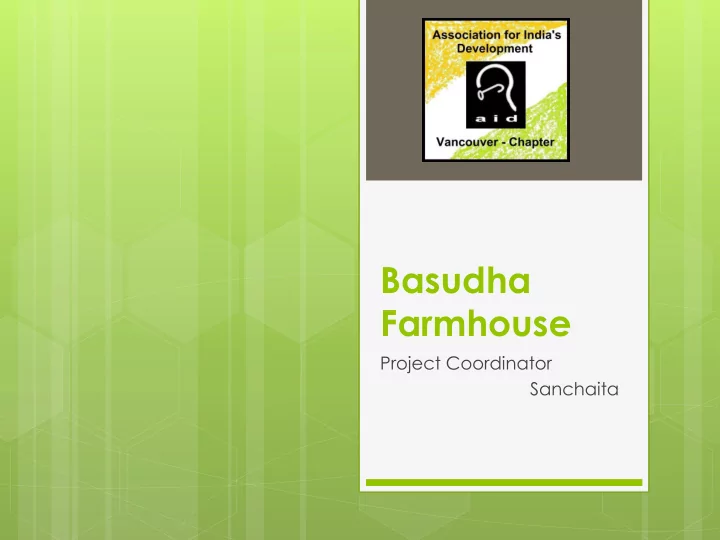

Basudha Farmhouse Project Coordinator Sanchaita
Basudha Farmhouse The NGO Name : Centre for Interdisciplinary Studies Established : 1993 Founder : Debal Deb Location : Rayagada District of Odisha
Basudha Farmhouse VRIHI – “Rice” Motivation : In view of the failure of all ex situ rice seed banks to protect the erosion of rice genetic diversity, CIS established Vrihi Vrihi began its journey in 1997 in partnership with Dr. Vandana Shiva (RFSTE) The first non-governmental rice seed bank for farmers The largest folk rice seed bank in eastern India In February 2009 Vrihi received the National Plant Genome Saviour Award from the Plant Variety Protection & Farmers' Rights Authority, Government of India.
Basudha Farmhouse Vrihi The Seed Stock The seed stock of Vrihi is composed of hundreds of rice samples donated by farmers. West Bengal, Bihar, Orissa, Jharkhand, Assam, Meghalaya, Tripura, Nagaland, Arunachal Pradesh, Chhattisgarh, Maharashtra, and Tamil Nadu. By 2008, the number of folk rice varieties in Vrihi’s collection has exceeded 700. There are numerous varieties that can withstand drought, flood and salinity, or have resistance to diverse pests and diseases.
Basudha Farmhouse Vrihi Seed Exchange Any farmer can receive any indigenous rice variety, free of cost, from Vrihi seed bank (Condition : The farmer must give, in exchange, seeds of at least one folk rice variety ) This arrangement is to ensure cultivation and multiplication of the seeds. Vrihi assist farmers who intend to take rice seeds in choosing the rice varieties appropriate for his/her farm’s land type, and soil characteristics, and local climatic conditions.
Basudha Farmhouse Basudha Basudha aims to conserve Bengal’s vanishing rice varieties; encourage, demonstrate and support organic farming and traditional methods of multiple cropping; and preserve and develop local knowledge of biodiversity and its uses. Established in early 2002 Basudha is a small (1.7 acre) farm in southwest Bengal about 220 km from Kolkata. Every year, samples of all rice varieties are brought from Vrihi and grown in small plots at Basudha. In order to obviate chances of cross-pollination between varieties grown on neighbouring plots, an innovative method of transplanting varieties with asynchronous flowering dates is employed
Basudha Farmhouse Relocation Basudha in Kolkata had no irrigation facility. Drought of 2011 made them take help from friendly farmers. But a need for a more sustainable solution to conserve the 700 varieties of rice arose. Search for an irrigated land in 5 districts of West Bengal and State Government failed. Finally, they received an offer of 1.1 acre of land with surface irrigation facility , from a group of indigenous farmers of Raygada district, Odisha . Transferred all rice seeds from Basudha and sowed them in the newly acquired land beginning from the 16th June 2011 They have rented some additional land for conservation farming in order to grow another 120 more varieties they have accessed this year.
Basudha Farmhouse The Farmhouse Every year, scientists, research scholars, students, activists and farmers from different parts of the world visit Basudha - to teach, learn from, and share ideas with, CIS workers and farmers in the surrounding villages. These guests and visitors stayed at Basudha’s adobe farmhouse, thatched with rice straw A modest charge on guests for their stay at Basudha. The tariff per capita per diem, is as follows: INR 200 for WWOOFers INR 300 for course students & researchers INR 500 for tourists and others INR 50 (around Euro 1) less for Repeat Visitors. The fees are for accommodation and simple vegetarian meals, with rice as staple. Anything extra (e.g. bread/ beverages/ meat) will be at cost.
Basudha Farmhouse Farmhouse at Odisha Presently they are staying in a bivouac – a mud shack built with the help of local villagers. We have also installed two solar units for light and fan The are hoping to build a more comfortable new farm house with attached bathrooms. Here’s where we come!!
Basudha Farmhouse The Project Highlights "zero-footprint" house using only locally available materials - stones, adobe, sand and lime. No kiln bricks, cement, timber and plastics will be used. A dome roof, using adobe and lime mortar, instead of bamboo beams for the roof. Accommodate at least 5-6 people , a room for the community seed bank, and a community meeting hall on the first floor. Total Budget – Rs.1,20, 000 ($ 2500 )
Basudha Farmhouse For more information about Debal Deb and his work : Website : http://www.cintdis.org/ Podcast : http://feeds.feedburner.com/mac/gWXa (No. 236 & 237) THANK YOU
Recommend
More recommend